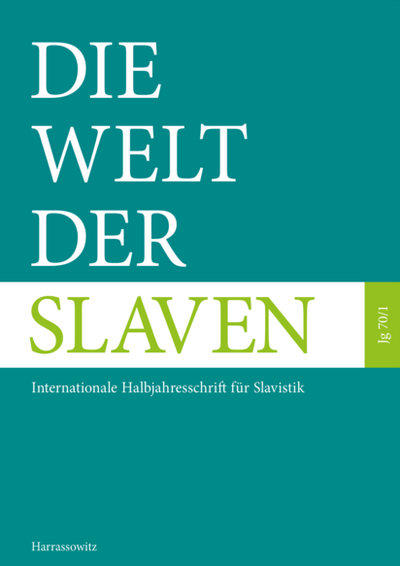Homage to female friendship
The poetry of Elizabeth Glaize (ca. 1772–1840) and the Sapphic tradition
DOI:
https://doi.org/10.13173/WS.70.1.043Schlagwörter:
Elżbieta Glaize, Lviv, Sappho, Gabriele Baumberg, Theory of FriendshipAbstract
The aim of the article is to present the work of a hitherto unknown writer from Lviv, Elżbieta Glaize (ca. 1772–1840). In 1801, Glaize published a collection of poems, Pierwiastki mojej muzy, most of which were devoted to female friendship. As I will argue this poetry owes much to the Sapphic literary tradition and inspiration from Sappho herself (through the poetry of the German poet Gabriele Baumberg and French Enlightenment editions). At the same time, I will identify those elements of Sappho’s poetry that became attractive to female writers of the late Enlightenment.
Literaturhinweise
Akt zgonu Karola Walckera [Death certificate of Karol Walcker]. 1825. In Księgi metrykalne parafii wyznania rzymskokatolickiego z terenu archidiecezji lwowskiej, sig 759. 145.
Akt zgonu Konstancji Glaize [Death certificate of Konstancja Glaize]. 1825. In Księgi metrykalne parafii wyznania rzymskokatolickiego z terenu archidiecezji lwowskiej, sig 759. 135.
Aleksandrowska, Elżbieta. 1966. Elżbieta Glaize. In Aleksandrowska, Elżbieta & Mikulski, Tadeusz (eds.), Bibliografia Literatury Polskiej „Nowy Korbut”, 467. Warszawa.
Anonymous. 1822. Bóg najwyższe dobro czyli mowa serca pobożnego chrześcijanina. Wrocław.
Aulotte, Robert. 1958. Sur quelques traductions d’une ode de Sappho au XVIe siècle. Bulletin de l’Association Guillaume Budé 1958. 107–122.
Baumberg, Gabriele. 1800. Sämmtliche Gedichte. Vienna.
Bender, Agnieszka. 1997. François Glaize – francuski tapiser pracujący w połowie XVIII w. dla polskich mecenasów, nowe ustalenia. Roczniki Humanistyczne 45. 257–271.
Błędowska, Henrietta. 1960. Pamiątka przeszłości: Wspomnienia z lat 1794–1832. Warszawa.
Buszewicz, Elwira. 2013. Fidus amor amicitiae. In Czechowicz, Agnieszka & Trębska, Małgorzata (eds.), Przyjaźń w kulturze staropolskiej, 103–116. Lublin.
Caine, Barbara. 2009. Introduction. In eadem (ed.), Friendship: A history, IX–XVI. London.
Catalogue des livres de la Bibliothèque de Monsieur Jaques Glaize Professeur de l’Academie de Leopol, et conseiller du Roi de Pologne. 1796. Léopol.
Cazatto, Vanessa. 2021. Sappho’s poetic language. In Finglass, Patrick J. & Kelly, Adrian (eds.), The Cambridge Companion to Sappho, 147–162. Cambridge. DOI: 10.1017/9781316986974.012.
Cyceron, Marek Tullius. 1899. Lelius czyli rozmowa o przyjaźni. Translated by Franciszek Habura. Tarnów.
de Grouchy, Sophie. 2017. Letters on sympathy. (Transl. Jonathan Bennett.) https://earlymoderntexts.com/authors/degrouchy (retrieved 6 Jan 2025).
DeJean, Joan. 1989a. Fictions of Sappho 1546–1937. Chicago.
DeJean, Joan. 1989b. Sex and philology: Sappho and the rise of German nationalism. Representations 27. 148–171.
de Montaigne, Michel. 2004. Essay on friendship. (Transl. Michael Andrew Screech.) London.
Domański, Juliusz. 2022. Safona – Katullus – Kochanowski: Przekład tekstów i przekład kultur. Meander 77. 67–92. DOI: 10.24425/meander.2022.142250.
Edictum (1). 1840. Gazeta Lwowska 39. 637.
Estreicher, Karol. 1874. Bibliografia polska XIX stulecia. T. 2 (G–L). Kraków.
Gilbert, Sarah & Gubar, Susan. 1979. The madwoman in the attic. New Haven.
Glaize, Elżbieta. 1801. Pierwiastki mojej muzy. Lwów.
Hanusiewicz-Lavallee, Mirosława. 2020. „Pół dusze mojej i głowy korona”: Idea żony przyjaciela w literaturze staropolskiej. Ethos: Kwartalnik Instytutu Jana Pawła II 26. 138–153.
Harper, Anthony & Ives, Margaret. 2000. Sappho in the shadows: Essays on the work of German women poets of the age of Goethe (1749–1832). Bern et al.
Houdar de la Motte, Antoine. 1773. VI. In Moutonnet de Clairfons, Jacques, Anacréon, Sapho, Bion et Moschus: Traduction nouvelle en prose, suivie de la « Veillée des Fêtes de Venus » et d’un choix […], 112. Paris.
Hunter, Richard. 2021. Sappho and Hellenistic poetry. In Finglass Patrick J. & Kelly, Adrian (eds.), The Cambridge Companion to Sappho, 277–289. Cambridge. DOI: 10.1017/9781316986974.021.
Kivilo, Maarit. 2021. Sappho’s lives. In Finglass, Patrick J. & Kelly, Adrian (eds.), The Cambridge Companion to Sappho, 11–21. Cambridge. DOI: 10.1017/9781316986974.002.
Kuran, Michał. 2013. O przyjaźni w staropolskich utworach okolicznościowych towarzyszącym zaślubinom (epitalamia) i śmierci małżonka (epicedia, treny, kazania pogrzebowe). In Czechowicz, Agnieszka & Trębska, Małgorzata (eds.), Przyjaźń w kulturze staropolskiej, 247–263. Lublin.
Moutonnet de Clairfons, Jacques. 1773. Anacréon, Sapho, Bion et Moschus: Traduction nouvelle en prose, suivie de la « Veillée des Fêtes de Venus » et d’un choix […]. Paris.
Ms Stefanyk National Science Library. Fonds A. Czołowski 141, act. 140. 8–9 (years
1809–1815).
Nekrolog E. Glaize. 1840. Gazeta Lwowska 25. 152.
Pawlak, Wiesław. 2015. „Amicorum colloquia absentium”: Przyjaźń i epistolografia w humanistycznej „respublica litteraria”. In Borek, Piotr & Olma, Marceli (eds.), Epistolografia w dawnej Rzeczypospolitej: Stulecia XVI–XIX. Nowa perspektywa historycznoliteracka, vol. V, 63–83. Kraków.
Rousseau, Jean Jacques. 1978. Wyznania. (Transl. Tadeusz Boy-Żeleński.) Warszawa.
Samborska-Kukuć, Dorota. 2022. Elżbieta Glaize Walkerowa i jej debiutancki tomik „Pierwiastki mojej muzy” (1801). Ruch Literacki 4 (373). 555–569.
Sappho. 2014. A new translation of the complete works. (Transl. Andre Lardinois & Diane Rayor.) Cambridge.
Schematismus des Königreiches Galizien und Lodomerien. 1815. Lemberg.
Sinko, Zofia. 1966. Powieść zachodnioeuropejska w Polsce stanisławowskiej na podstawie inwentarzy bibliotecznych i katalogów. Pamiętnik Literacki 57(4). 581–624.
Smith, Adam. 2021. Teoria uczuć moralnych. (Transl. Danuta Petsch.) Warszawa.
Spis osób we Lwowie zmarłych. 1825. Dodatek do „Gazety Lwowskiej” 57. 740.
Wollstonecraft, Mary. 1975. A vindication of the rights of woman (1792). (Ed. Miriam Brody Kramnick.) Harmondsworth.
Woolf, Virginia. 1997. Własny pokój. )(Transl. Anieszka Graff.) Warszawa.
Żukowska, Kamila. (Forthcoming.) O Elżbiecie Glaize i „Pierwiastkach mojej muzy” (1801), zbiorze poświęconym przyjaźni – rekonesans badawczy. Pamiętnik Literacki.

